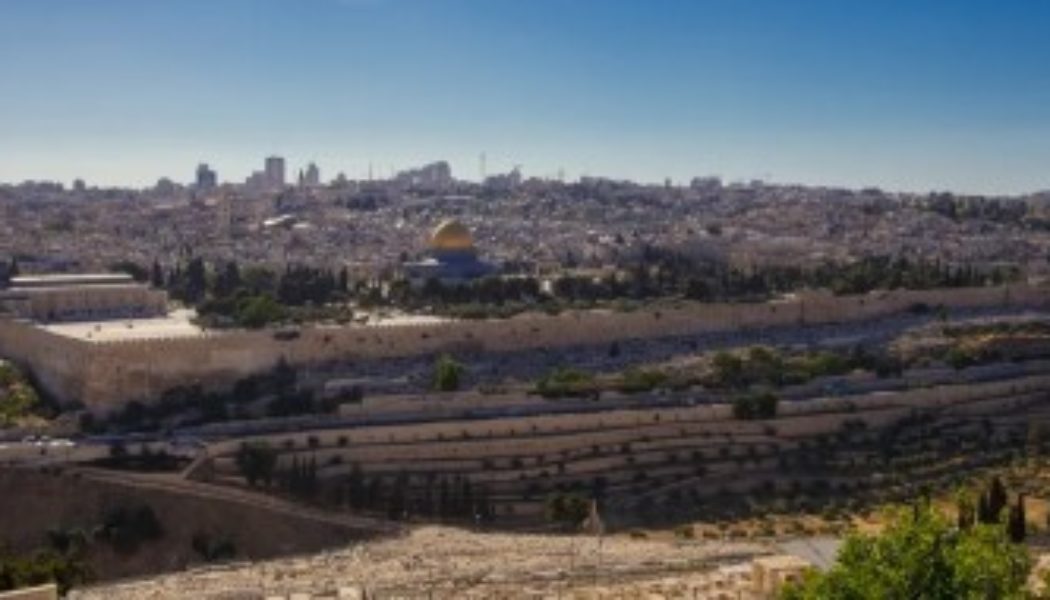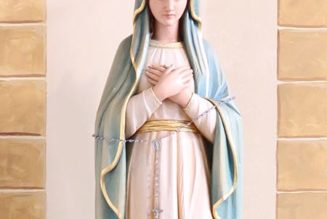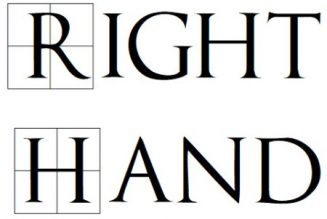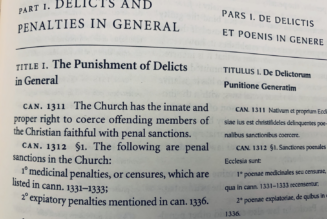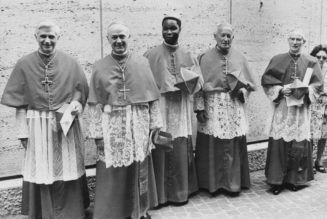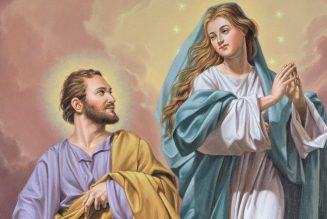5th Sunday of Lent
By Fr. Victor Feltes
In the chapter preceding our reading from John’s Gospel, Jesus was preaching to a crowd of people in the Temple courtyard. Because of his words, “some of them… wanted to arrest him, but no one laid hands on him… Then each went to his own house, while Jesus went to the Mount of Olives.” But early the next morning Jesus returns to the temple area and all the people start coming to him. He sits down and teaches them, setting the stage for today’s famous scene with the woman caught in adultery.
I would like to describe for you the geography of these places referenced in our gospel. The Mount of Olives looks down over the old city of Jerusalem with a valley, the Kidron Valley, situated between them. The Mount of Olives descends about four hundred feet to the valley below. At the bottom of this hillside is the Garden of Gethsemane, where St. John tells us Jesus often met with his disciples. On the opposite side of the valley, the ground rises up again some two hundred feet to Jerusalem’s ancient city wall and the Temple Mount.
The Mount of Olives gets its name from an olive orchard which grew on its western slope facing the city. At harvest time, its olives would be gathered, brought down the hillside, and crushed to make olive oil. This oil was used for food, for medicine, to make skin clean and radiant, and as fuel for oil lamps. The Garden of Gethsemane was once a location for this processing – the name Gethsemane means “oil press” in Hebrew.
After the Last Supper, as was his custom, Jesus crossed the Kidron Valley and entered the Garden of Gethsemane with his disciples. He said to them, “Sit here while I pray.” He took Peter, James, and John along with him a little further on, and began to be troubled and distressed. Then he said to them, “My soul is sorrowful even to death. Remain here and keep watch.” St. Luke records that Jesus was then in such agony and prayed so fervently “that his sweat became like drops of blood falling on the ground.” Like olives being crushed to bring forth precious oil at harvest time, this is the beginning of Jesus being crushed in his Passion.
In fulfillment of the words of the Prophet Isaiah, he was crushed for our iniquity and pierced for our sins, “He bore the punishment that makes us whole, by his wounds we were healed.” Without the crushing of the olives, we would not enjoy the blessings of their oil. Without Christ’s Passion we would have no Eucharistic food, no saving medicine for our souls, no cleansing, no resurrected glory for our flesh, and no light of hope in our darkened world.
It is interesting that Jesus liked to come to the Garden of Gethsemane to pray. The Gospels usually record him climbing up to higher places to pray, like Mount Tabor or mountains overlooking the Sea of Galilee. But here Jesus prays in a valley, perhaps a dark valley, depending on the foliage.
When I traveled to the Holy Land in 2016, I visited the Garden of Gethsemane where a number of very old olive trees still grow. Looking across the valley there, it occurred to me there that the upper portions of the Temple would have been visible above the city wall. Just as we sit before the presence of Jesus in the Tabernacle, I could imagine our Lord facing his Father’s dwelling place, praying with personal devotion and receiving consolation, knowing that his God was there.
Why did Jesus bring his disciples with him to the Garden of Gethsemane on Holy Thursday night when he could have easily gone alone? In part, it was so that they could be eyewitnesses of the events there, but Jesus also did this to provide companionship for himself in his darkest hours. Like the comfort of having his mother Mary at the Cross, Jesus having his disciples with him in the Garden made him feel a little less alone.
The scribes and Pharisees in our gospel story today do not care about the woman caught in adultery. They do not actually care whether she gets punished or forgiven. If they really cared about her adultery then why didn’t they bring along for judgment the man she sinned with also? I doubt this woman was caught in the act and Jesus’ enemies hatched their plan all on the same morning. Her affair may well have happened many months or years before this moment. They are merely using her as a prop, as a tool, as a means to an end: in order to entrap Jesus. They want our Lord to say something against the Law of Moses so that they may condemn him.
At first, Jesus seems to feign disinterest. When they continue pestering him to answer, he declares: “Let the one among you who is without sin be the first to throw a stone at her.” Then he returns to writing something (we don’t know what) upon the ground. “And in response, they went away one by one, beginning with the elders,” discarding the woman and leaving her alone with Jesus. But this woman wasn’t a prop to Jesus. He sees her as a person and personally cares about her. “Has no one condemned you?” he asks her, “Neither do I condemn you. Go, and from now on do not sin any more.”
How do we relate to Jesus? Do we relate to Jesus personally or do we treat him merely a means to an end? We all want to go to Heaven of course, and Jesus wants that for us too, but do we desire a deeper personal relationship with Jesus Christ as well? Do I care what he thinks, how he feels, what he wants? Jesus desires to be more than a religious prop or tool for us.
Let your daily prayer be interpersonal. Prayer is not just saying words or casting wishes, it is speaking with a friend in heaven. So encounter Christ in prayer. Meet him in your place of prayer at home. Meet him before his altar and his tabernacle. Come keep watch with in the Garden after the evening Mass on Holy Thursday, which is just around the corner. Could you not keep watch with him one hour? Give Jesus the gift of your companionship, this and every day.
Join Our Telegram Group : Salvation & Prosperity
